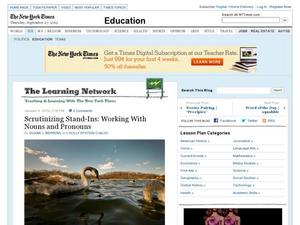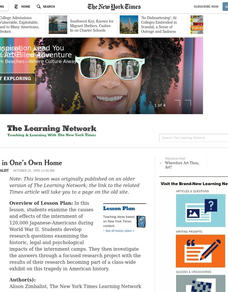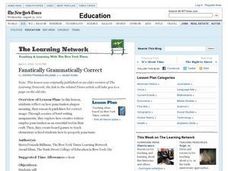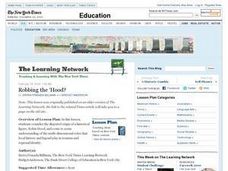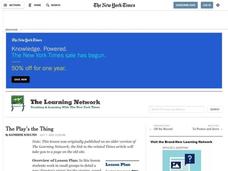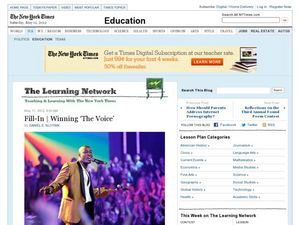Curated OER
Developing Dialogue
Why do people argue? Use the article "A Holiday Medley, Off Key" to discuss the struggles that interfaith couples face when choosing to celebrate certain holidays. Then, in small groups, encourage learners to write dialogues that...
English Enhanced Scope and Sequence
Differentiate between Formal and Informal Language
The Pledge of Allegiance, the Gettysburg Address, the National Anthem, and the Preamble to the Constitution all get close attention in an exercise that asks learners to rewrite these formally-worded documents into informal language....
PBS
Facts vs. Opinions vs. Informed Opinions and their Role in Journalism
Do reporters write about what they see, or what they think? Examine the differences between investigative writing and opinion writing with a lesson from PBS. Learners look over different examples of each kind of reporting, and convince...
Curated OER
When Is a Noun a Verb? Examining Double Duty Words
The New York Times' Learning Network provides great lessons! This one uses articles from the paper to help readers understand homonyms like mail (verb and noun). It also includes an exercise in reading informational text. Links to the...
Curated OER
Student Opinion: How Far Would You Go for Fashion?
Is being uncomfortable worth it if you look good? Inspire discussion about fashion and culture with a brief New York Times article about painful fashion. Whether used as a persuasive essay prompt or as a discussion starter, class members...
Curated OER
Budget Busters
Use this economic activity to focus on writing summaries of informational text. First, middle schoolers define common economic terms used to describe news about the economy. They closely read news about the federal budget deficit and...
Curated OER
Strong Convictions
How can the rhetorical structure of an editorial help to develop its argument? Use this New York Times editorial to emphasize the importance of structure in a piece of informational text. Adolescent writers then use the editorial as a...
Curated OER
Don't Believe the Hype
Are hand sanitizers good for you? What about the environment? Research the science behind commonly used cold medicines. The class reads an article, creates a product poster, and conducts independent research on product claims made by...
Curated OER
Science in the Court Room
Share their opinions on the use of DNA databases in criminal investigations. After reading an article, they evaluate the pros and cons of the databases and work in groups to answer discussion questions. They write a letter to a state...
Curated OER
Easy Access: Creating Annotated Versions of News Articles
How can news coverage be made more accessible for teens? Model for your class how to use technology to annotate news stories containing unfamiliar references that hinder their interest in and understanding of a news story. Use the...
Curated OER
Scrutinizing Stand-Ins: Working With Nouns and Pronouns
Use the Schoolhouse Rock episode, "Rufus Xavier Sarsaparilla," to introduce a study of pronouns. Learners consider antecedents, cases (nominative, objective and possessive), as well as types of pronouns, and then craft sentences using...
Curated OER
When is a Noun a Verb? Examining Double Duty Words
Act and act, address and address...there are so many words in our dictionary that can function as nouns or verbs. Start this lesson by having your class list as many as they possibly can. When an adequate list presents itself, have your...
Curated OER
Sound Blending Lesson Plan
Mr. Snowman wants to help emerging readers understand compound words, so he segments some familiar words to help them see that they are made of two distinct words. Learners repeat the words, both segmented and blended, and observe them...
Curated OER
On the Dots
If you want your class to practice reading informational texts and answering related questions, this short exercise from The New York Times' "Learning Network" might be helpful. It includes an article on Dippin' Dots and uses...
Curated OER
The New YouTube
Can you guess how many hits YouTube gets in one day? If you said two billion, you're wrong. If you said three billion, you're getting closer, but you're still over a billion hits away! Use this article to bring current events into the...
Core Task Project
Whatif by Shel Silverstein
What a skillful way to incorporate Shel Silverstein, a wonderful author, into the classroom. Composed of three tasks, children are led through a series of text-dependent questions that force them to unveil the meaning of Silverstein's...
Curated OER
Prisoner in One's Own Home
Examine the internment of Japanese-Americans during World War II. After reading an article from the New York Times and exploring the author's word choice, young readers find the central idea in the text and work on researching additional...
Curated OER
Fanatically Grammatically Correct
Research guidelines for correct usage, then explore how creative writers employ punctuation as an essential tool in their craft. Secondary classes create board games to teach elementary school students how to properly punctuate. From the...
Curated OER
Not Just the Facts
Encourage your learners to explore the differences between hard news and news analysis. They outline a complex news analysis about the upcoming presidential election, then endeavor to write an analysis of the same topic, using local...
Curated OER
Of Human Bondage
How does the particular point of view in a situation affect the way it is presented? Focusing on perspectives on slavery during the Civil War, middle schoolers use research to write narratives from the points of view of their historical...
Curated OER
Stop the Fighting and Start Uniting
Research current and proposed peace talks around the world with this New York Times lesson, Using the Darfur peace talks in Abuja, Nigeria as a starting point, middle schoolers create a news program on the subject. They propose a future...
Curated OER
Robbing the 'Hood?
Students investigate historical figures and how they play a role in tourism by reading and discussing the article "When Robin Hood Supped, Was it Yorkshire Pudding?" In groups, students investigate issues related in the article in...
Curated OER
The Play's the Thing
Students describe to a partner theater experiences they have had in their lives that were memorable, and analyze why. They study about one director's original artistic choices for staging Shakespeare by reading and discussing "Nature's a...
Curated OER
Winning "The Voice": Cloze Exercise
This New York Times Learning Network exercise provides a cloze exercise along with a word bank that readers can use to complete the passage about the television show, "The Voice" and Jermaine Paul, a recent winner. Another option is to...












